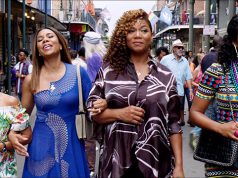The rule in romantic comedies is that if someone is eventually going to dump one romantic partner for another, it needs to be clear that the first partner wasn’t right for him or her anyway. If either partner would be a suitable mate and the choice between them is difficult, then there’s a chance the audience won’t like the decision that is ultimately makes, which will ruin the intended effect of the romantic comedy, which is to be light and cheerful.
The situation in “Something Borrowed” is very tricky indeed. Dex is already engaged to Darcy, you see, so leaving her for Rachel — the protagonist, the sympathetic main character — must be completely 100 percent justified. There cannot be even a smidgen of doubt that Darcy is all wrong for Dex, or else Dex will come off as a monstrous cad for eventually following his heart, and Rachel will seem like a cruel home-wrecker.
So what’s the solution? Make Darcy the worst human being ever to walk the face of the earth.
Darcy is played by Kate Hudson, who is finally pulling out all the stops in her decade-long campaign to make us loathe and despise her. Darcy is shallow, vain, self-absorbed, reckless, irresponsible, and narcissistic. She never thinks any further than five minutes into the future, except for when she practices crying so she’ll know how her mascara will hold up on the wedding day. She’s a drunk, a mooch, a show-off, and a flake. She is pure id, focused only of her own desires, oblivious to how her actions affect those around her. I am not an expert, but in clinical terms, she may be a sociopath.
Darcy is not the main character, thank goodness. That would be Rachel (Ginnifer Goodwin), her best friend since childhood. Rachel is kind, generous, meek, and good-hearted, and has spent her life feeling inferior to the prettier, more popular Darcy. She’s the one who introduced Darcy to Dex (Colin Egglesfield), back when she and Dex were study partners and platonic friends in law school. Rachel always had a crush on Dex, but she didn’t think someone as handsome and suave and perfect as he is would ever go for a frumpy gal like her — she wore glasses in law school!!!! — so she let Darcy take him.
But now, just two months before Darcy and Dex’s wedding, Rachel and Dex get a little drunk and have a little sex. (This happens in the first 10 minutes of the movie.) It is more than just a fling, too: They discover that they truly have feelings for each other, and always have. Dex’s love for Darcy is whatever it is — the movie makes no attempt to show what he, or anyone else, might possibly see in her — but his and Rachel’s love is true, deep, and mature. They’re practically soulmates. They clearly belong together. But how could Rachel break up her best friend’s relationship?
That is quite a pickle. Or at least it would be if real people were involved, or if it were addressed with any degree of intelligence. I don’t know what Emily Giffin’s novel is like, but the screenplay (by “Men in Trees” and “90210” scribe Jennie Snyder) is paralyzingly simple-minded. Rachel and Dex sneak around behind Darcy’s back. This would normally be controversial behavior for a protagonist, but since Darcy is such a rancid, infuriating bimbo, we never feel even a twinge of reproach for Rachel and Dex’s duplicity. All we feel is frustration over both parties’ refusal to face the issue head on and make the only possible decision, which of course is to dump Darcy and live happily ever after together. (There’s also the exasperation of scenes where Darcy says, “OK, you two, I know what’s going on here,” and of course it’s a false alarm; she talking about something else, something minor and trivial, and we roll our eyes and grit our teeth.)
The film’s central premise is that Rachel doesn’t want to hurt her best friend. And that’s exactly why the movie fails: because we don’t understand why Rachel likes Darcy in the first place. There’s not one instance in the entire film — not one! — of Darcy doing anything to show us why Rachel is devoted to her. Even when Darcy throws Rachel a birthday party, she hogs the spotlight for herself — a fact that Rachel notices and comments on. So it’s not like Rachel isn’t aware of what a terrible friend Darcy is. She’s aware. She just … loves her anyway? Apparently?
The one voice of reason is Ethan (John Krasinski), Rachel’s platonic best friend and her supposed confidante (though she hides the affair from him for a long time, too). Ethan says what the audience is thinking — Make up your mind already! And make Dex make up his! — and ameliorates the pain somewhat. But then he is saddled with his own completely stupid subplot, in which he’s stalked by a desperate, clingy psycho (Ashley Williams) with whom he had a one-night stand, and he determines the only way to get rid of her is to tell her he’s gay. And even THEN she wants to stand by him! Because she’s needy and crazy, ha ha!
John Krasinski has a few amusing moments as Ethan, and Steve Howey is fun as Dex’s goofy best friend Marcus. But as Dex, Colin Egglesfield, trained on “All My Children” and “Melrose Place,” is as blandly handsome and personality-free as you’d expect someone trained on “All My Children” and “Melrose Place” to be. He’s outmatched by Ginnifer Goodwin, who’s immensely likable and smart, and who we never believe for a second would have trouble meeting men or making friends.
Directed by Luke Greenfield (“The Girl Next Door”), the film seems to think that we will find something entertaining about Darcy just because she’s played by Kate Hudson. It’s hard to imagine a worse miscalculation. The character is maddening and loathsome, like a comedian’s parody of annoying party animals, except that she’s meant to be taken seriously. Why make us hate — hate hate HATE — a character to whom the protagonist is fiercely loyal? We can’t relate to anyone here, except maybe Ethan, who wants out of this fiasco as soon as he hears about it. I certainly know that feeling.
[Reprinted from Film.com.]
D (1 hr., 43 min.; )





